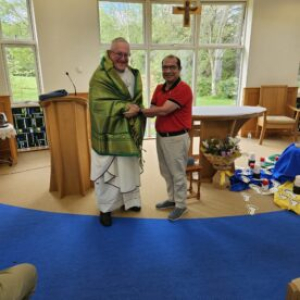Peter MALONE
Thousand Lines, A/ Tausend zeilen
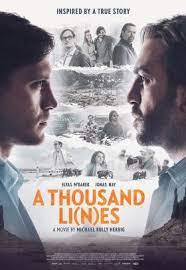
A THOUSAND LINES/ Tausend Zeilen
Germany, 2022, 93 minutes, Colour.
Elyas M'Barak Jonas Nay, Jorg Hartmann, Maria Burchard, Michael Ostrowski, Michael Meertens, Sara Fazilat, Jeff Burrell.
Directed by Michael Herbig.
The German title is very straightforward – the poster for the English title is able to make a sardonic comment that the German title cannot: A Thousand Li(n)es.
With television footage of Donald Trump appearing early in the film, we immediately think of “Fake News”. And, this is a film about the fabrication of news, based on actual characters and events, the prestigious German magazine, Der Spiegel, and a multi-award-winning young journalist. (With an acknowledgement to Wikipedia providing a great deal of information about characters and events, it is worth Googling Claas Relotius to read the background of this fictionalised version and how it keeps quite close to what actually happened.)
Basically this is a drama, a focus on a Spanish-born German journalist for Der Spiegel, Juan Romero, who wrote the book on which this film is based. But, there is some joking in the introduction about this being a fiction, based on fact, but allegedly mostly made up – honestly! This sets a tone that this treatment is sometimes satiric, sometimes a parody, quite funny moments. The film has been criticised by some for its parody tone, the critics wanting a more straightforward, deeper exploration of the journalist creating stories, being hailed for his writing, winning many awards, investigated and exposed.
The journalist of this film, called Lars Bogenius (Jonas Nay) is presented as something of a nice, naive journalist, very active in the field, Syria, US, Mexico… And finding dramatically significant stories which go on to win (as they did in real life) many press awards. Only gradually is the true Lars revealed. But the dramatic focus of attention is on Juan Romero (Elyas M’Barak), a sincere journalist, loving wife, four charming little daughters, who is invited by Bogenius to collaborate in articles, then found wanting, but also determining that there are inconsistencies in Bogenius’s stories, his travelling to Mexico and the US with his photographer to try to find out the truth. And he does, providing evidence.
However, in its satirical way, the film is highly critical of the editors of the magazine, Chronic standing in for Der Speigel, their ambitions, place in the company’s hierarchy, of playing golf, urging journalists to write dramatic articles, articles to get readers emotionally involved. And the satire continues in their fending off the criticism, unwillingness to face the truth, their unmasking even as they condemn Romero.
While there have been many serious films about investigations of journalistic fraud, the satiric tone of this film engages the audience imagination and sense of humour as it exposes the fraud.
- A true story? Based on an actual journalist? His stories? His self-promotion? Awards? And writing for der Spiegel?
- The tone of the film, reporting on actual events, the truth, but the opening and the comment on much of this being fictionalised, honestly? The satiric tone and the parody rather than a serious investigation? Although the investigation was serious?
- The story of Lars Bogenius, enigmatic background, the story of his sister and that being a fiction, his wide travels around the world, the range of stories, especially the civil war in Syria, interviews with athletes? The many articles? His status with the management of the magazine, their promoting him, urging human interest stories more than factual stories, the awards?
- The introduction to Juan, Spanish background, working for Der Spiegel, his reputation, support of his wife, the four little girls, family life? His work for the magazine, reputation, contact from Bogenius, their working together, the research in Mexico, work with his photographer? Bogenius and his complaints, putting down Juan? The authorities?
- The portrait of the management, their ambitions, their perspective on the magazine, the kinds of stories they wanted, promoting bugging years, going to the award ceremony? Juan and his information, then meeting him, condemning him, the rejection? And this coming back to bite them?
- Juan, finding the inconsistencies in the articles, his research, contacting Bogenius? The decision to go to Mexico and America, with his photographer, interviewing the various people, especially the background story in America, interviewing the man in his trailer, the discovery of the truth, others interviewed and their reactions?
- The authorities, not accepting the research, Juan and his being away and the effect on his family, his little girls thinking he did not love them, but the support of his wife?
- The exposure of Berg genius, his background story, the reality of his short visits to locations, his making up the story, the appeal for the children in Syria, exposure?
- The effect of the satirical approach, the comic touches, the serious investigation, and the fact that this was based on actual characters and events?
Book Club: The Next Chapter
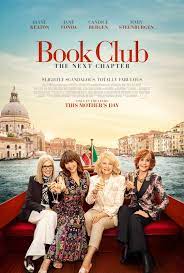
BOOK CLUB: THE NEXT CHAPTER
US, 2023, 103 minutes, Colour.
Diane Keaton, Jane Fonda, Candice Bergen, Mary Steenburgen, Andy Garcia, Craig T.Nelson, Don Johnson, Giancarlo Giannini, Hugh Quarshie.
Directed by Bill Haldeman.
We may not remember the first chapter of Book Club, let alone what the members were reading. However, it didn’t bring together Jane Fonda, Diane Keaton, Candice Bergen, Mary Steenburgen and audiences enjoyed their company. For those who would like to see them again, here we are.
The film opens during lockdown, the four friends trying to deal with the isolation, then prohibitions lifted, and they can come together, big hug!
The added attraction for this film is that it is a trip to Italy, quite a touristic visit to Rome, and equally touristic visit to Venice, and, despite quite some hazards along the way, a wedding in Tuscany. Emphasis on scenery, emphasis on dresses and costumes, emphasis on food and drink (allowing for a car breaking down and a night in a Tuscan jail).
When Diane Keaton put on the hat, boater, for the wedding ceremony, it is like Annie Hall revisited. Candice Bergen, playing a retired judge, with some sardonic comments, reminds us of her Murphy Brown. And, we can say with certainty, Jane Fonda filming this at age 84, has not been harmed in any way by aerobics.
There are some men in the background in the early part of the film, Craig T.Nelson’s husband to Mary Steenburgen, with heart trouble, she overly concerned; there is Andy Garcia, elegantly ageing, partner to Diane Keaton; and there is a very dapper Don Johnson proposing to Jane Fonda. So, for the four friends, what better than a bachelorette party travelling in Italy! (And, for those influenced by the movies and intending to imitate, they seem to be more than financially able to pay for the trip.)
This is definitely a film for a women’s audience, the stars themselves with their long careers, awards, popularity. There is a lot of women’s talk, friends advising each other, some sardonic quips, more than might be expected double entendres, and the audience at the preview session (a smattering of men there) loudly enjoying sharing with the members of Book Club.
As regards a men’s audience? The men in the film are glimpsed early but then arrive for the final fanfare, the wedding and the not-wedding! And, maybe, that’s where the male audience will enjoy the trip.
Interesting to note that of the same time, 80 for Brady was released, very much in the same vein, though the travellers to Houston and the Super Bowl – and with Jane Fonda as the common denominator.
And the advice, as for 80 for Brady, this is a film for older mothers and grandmothers – unless they beat you to it and have seen it already!
- The popularity of the first film? The stars and their impact? Friendship?
- The experience of lockdown, the Zoom communications, the film establishing each of the characters, end of travel bans, reunited, plans, Vivian getting married, the response of the others, Carol losing the restaurant, Sharon retiring, Diane and her relationship with Mitchell? Memories of the plan to go to Italy?
- The decision to go to Italy, the visits to Rome, to Venice, Tuscany, the touristic satisfaction?
- Each of their stories:
Vivian, age, never married, relationships, freedom, her relationship with Arthur, the decision to get married, Arthur being genial, dapper? The adventures on the trip? The buying of the bridal dress? The wedding sequence, not wanting to get married, the vows in the not-marriage?
Diane, the past, with Mitchell, the possibility of marriage, going on the trip, something of a chaperone, the adventures?
Sharon, former judge, sardonic in her comments, enjoying the trip, the encounter with Ousmane, sparring with the chief of police, his turning up, the helicopter to the wedding, his lending her his coat the ceremony, her performing the ceremony?
Carol, the long marriage to Bruce, the family, his illness, taking care of him, over-care, her cooking past, memories of chef Gianni, losing the restaurant, the trip to Italy, her enthusiasm, the restaurant, her meeting Gianni, pounding the dough during the night, phone calls to Bruce? The others and their advice to her to let up on him?
- Men, not seen very much, Mitchell as genial and supportive of Diane, Arthur, patient with Vivian, Bruce and his illness, the golf, the phone calls? Ousmane, his charm, the song and the music, on the canal with Sharon? The police chief, the initial confrontations, the encounter on the lagoon at night, the helicopter, lending his coat? Joni, the genial cook, memories of the past?
- The adventures, the plane, the porters at the airport, losing their luggage, the encounter with the police? Diane and the issue of Harry’s and ashes – and eventually scattering them? The recovery? The shopping for the dresses, in Venice, in the gondola, the police chief and Sharon with Ousmane? The restaurant, Carol in the encounter with Joni? The decision to go to Tuscany, the car, the breakdown, the police chief, suspicions, behind bars? Out, the helicopter, the arrival at the wedding?
- The wedding, the dresses, Arthur and Mitchell present, Carol on the phone with Bruce and his turning up? The quartet and having to start again, the prissy master of ceremonies? Sharon presiding when the priest did not turn up? Vivian not really wanting to marry, Arthur and his declaration? Mitchell and Diane, the wedding?
- The aftermath and audiences wanting to be with the Book Club again?
Keeping up with the Chapters – this time Irish Province.
Keeping up with the Chapters – this time Irish Province.
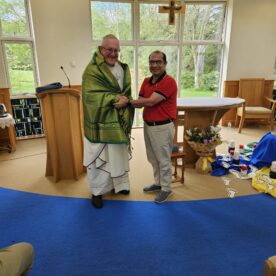
Incoming Provincial, Joe McGee with Abzalon - and a souvenir from India (see below)
40 members of the Irish MSC Province gathered on Sunday evening, 30th April in Mount Saint Anne’s Retreat & Conference Centre, Portarlington, Co. Laois to begin our first ever Open Provincial Chapter.
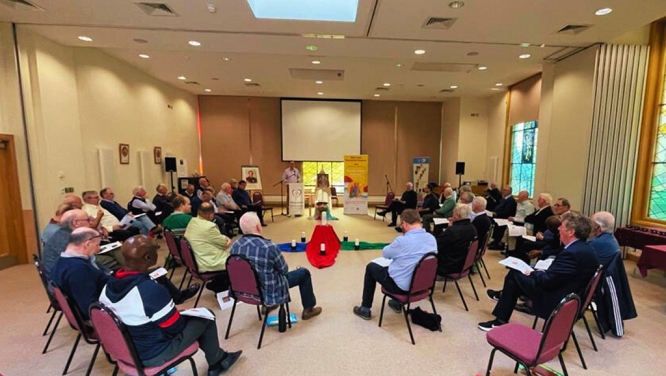
Provincial Fr Carl Tranter MSC, welcomed everyone and expressed his desire that the Chapter be a grace-filled experience for all as they discussed and planed a roadmap for the years ahead for the Province. Fr Carl and Tony Horgan led the Opening Liturgy, welcoming all present and thanked those who had travelled from near and far: from Ireland, England, USA, Southern Africa, Kenya, Venezuela and South Sudan and extended a huge welcome to our Superior General, Fr Absalón Alvarado MSC, who will journey with them for the week of our Chapter. Fr Absalón’s presence will be hugely enriching for everyone. Candles were lit representing the five continents of the congregation and the eight countries they currently have confreres working in. Jimmy Mitchell, as the oldest member of the Chapter, lit the Chapter candle.
During the Opening Liturgy all members of the Chapter declared their presence and desire for the week ahead and the Facilitator ,Frances Heery, Secretary to the Chapter ,Paula Ryan-Kavanagh, Translator ,Jaime Rosique and Scrutineers Giacomo Gelardi, Alan Neville and Peter Ng’ang’a, were prayerfully welcomed and formally approved.
The first day began by introducing the MSC theme through reflection on the Road to Emmaus. Members were invited to share their experience of life in two and fours inspired by the two disciples on the road. This was felt by all present as a profound experience of getting to know each other in a deeper way. The day concluded with Eucharist led by Fr Absalón.
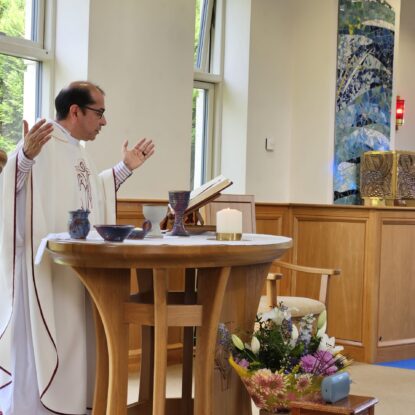
The second day (Tuesday 2nd May) began in a creative way when the Facilitator ,Frances Heery conducted an interview with Carl inviting him to share his experience of being Provincial. The highs, the lows and moments of inspiration were shared by Carl and his honesty was greatly appreciated. Carl’s sharing provided a springboard for group reflection regarding how members experienced the life of the province at the moment.
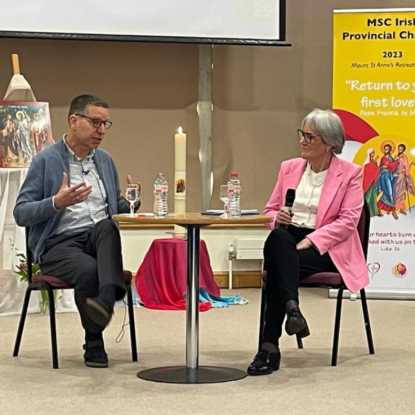
Eucharist was celebrated by three of the confreres from Venezuela, Yonys Mendoza, Eliel Araujo and Deiby Fuenmayor.
On Wednesday 3rd May, Each group presented a guidepost for the Province and work will continue on these in the coming years for the good of the Province. Some of the main themes discussed were, laity, environment, healing past hurts, mapping the future for Venezuela and Southern Africa and the Missions as a whole.
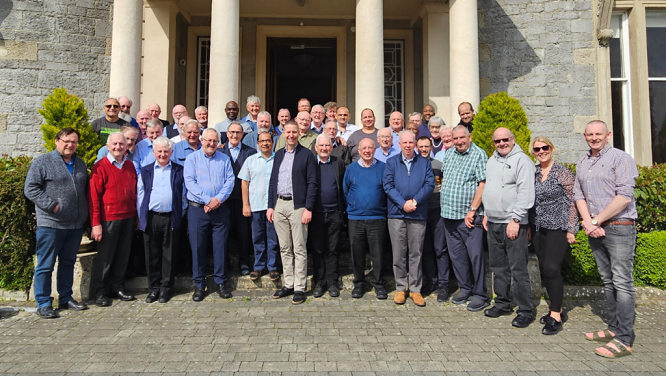
Chapter participants
On Thursday 4th May the first session was dedicated to conversation and sharing on the qualities and characteristics required for the role of Provincial Councillor. Fr David Nixon MSC and Fr Manus Ferry MSC were elected and both accepted their election.
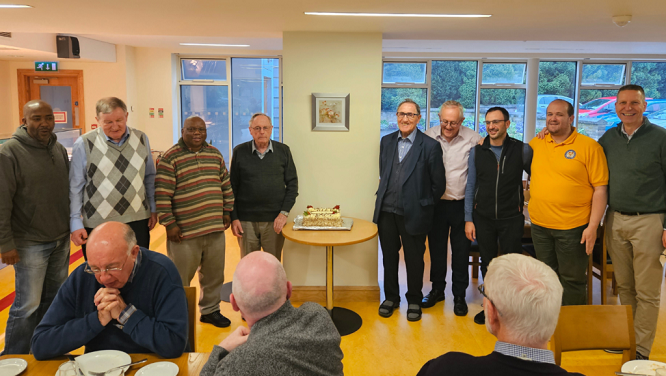
The day continued with an input from our MSC Safeguarding Manager, Ms Mary Tallon.
On Friday 5th May, Provincial, Fr Carl Tranter MSC, gave an update on new formation project being set up in Kenya and a possible new mission with the Indian Union for Ireland/UK. The Chapter indicated their desire to encourage the incoming Provincial Leader Team to explore this option with the Indian Union. Fr John Fitzgerald MSC, Provincial Bursar, and Mrs Mary Kelly, Finance Manager, presented a Finance Report. Election of two Delegates to attend the General Chapter – Fr Julius Katjipa MSC and Fr Carl Tranter MSC’
The final day, Saturday 6th May, involved table conversation on the following question: As you return to your particular Jerusalem, what are you taking back with you from the experience of walking together this past week? This was followed by a time of sharing.
Fr Carl Tranter MSC, Provincial, proposed to the Chapter that Fr Joe McGee MSC take over as Provincial on 1st August 2023. Fr Carl will finish his term as Provincial on 31st July. This was approved unanimously.
The work of the Chapter concluded with final words from Fr Carl. He said it has been a historic week as we had our first ever Open Chapter. It had gathered nearly half of the Province together in conversation and sharing. He is deeply thankful for the sense of brotherhood in their time together which has been strengthened. As we come to the end of the Chapter we are ready for the Return to Jerusalem. We return to our place and hopefully discover something new about it. Return with the fruits of our journey and the desire to continue conversations, to engage deeply and live our MSC commitment and brotherhood more fully. It has been a rich week. Please God we return changed and wishing to grow.
The Chapter concluded with Eucharist led by Fr Joe McGee MSC, Fr David Nixon MSC and Fr Manus Ferry MSC (members of the incoming Provincial Leadership Team).

Fr Absalón MSC presented Fr Carl Tranter MSC,

Fr Joe McGee MSC
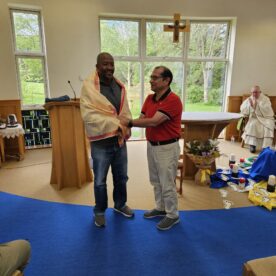
and Fr Peter Ng’ang’a MSC with symbols from India representing hope for the mission ahead.
Fr Carl Tranter MSC as President of the Chapter then blows out the Chapter Candle to conclude the Chapter week.
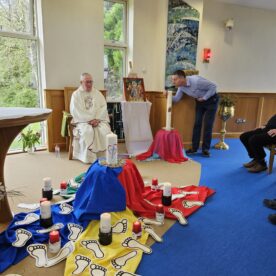
Beau is Afraid
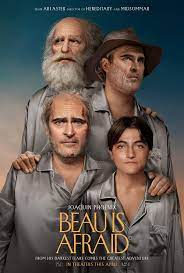
BEAU IS AFRAID
US, 2023, 179 minutes, Colour.
Joaquin Phoenix, Patty LuPone, Amy Ryan, Nathan Lane, Kylie Rogers, Denis Menochet, Parker Posey, Zoe Lister-Jones, Amen Nahapetian, Stephen McKinley Henderson, Richard Kind, Hayley Squires, Bill Hader, Michael Gandolfini, David Mamet.
Directed by Ari Aster.
Beau is afraid – and we, the audience, along with him. And there is a great deal to be afraid of, whether it be in reality or, more probably, in Beau’s tormented mind and imagination.
Writer-director, Ari Aster, made quite an impact with his first two feature films, Hereditary and Midsommer. They were praised as horror films. However, he had already directed a short films including, in 2011, a seven minute film called Beau, the Genesis of this feature film. And, Beau is Afraid, has also been described as horror. But, it is not in the vein of blood and gore (though there is some of that), rather, as publicity describes it, a tragicomedy. How much comedy will the audience find is a moot point. There is more tragedy.
Beau is Afraid is an Odyssey, definitely very Odd. While the writing and the direction are highly imaginative and, frequently, quite unexpected, the film is often something of an endurance to watch, to sit through. And, it runs for three hours. But, it is a credit to Joaquin Phoenix that we keep watching. Phoenix has proven over the decades that he can perform quite a range of characters (even Jesus himself in Mary Magdalene), but winning and Oscar for a performance of quite a different kind of madness in Joker. This performance certainly matches that one.
It does not take long to realise that there is something quite wrong with Beau, his mental condition, paranoia and imagination, living in squalor in a very ugly neighbourhood in a bizarre city, prone to memory loss, his therapist prescribing drugs to be taken with water, then a water failure, Beau’s collapse. Then there is the strange gradual revelation of his relationship with his dominating mother, his dead father. And some flashbacks to some seemingly happy at times.
Significant stops along the Odyssey include being rescued by a sympathetic couple, Grace and Roger (Amy Ryan and Nathan Lane), their suicidal and taunting daughter, their violent assistant, PTSD from war. Another stop is with a travelling theatre troupe, The Orphans of the Forest, welcoming Beau, his watching the rehearsals and imagining himself, his much older self, perhaps a variation on King Lear, trying to find his family.
By this stage of his Odyssey, Beau can hardly distinguish reality from fantasy. And, things deteriorate when he finally arrives home for his mother’s funeral, only to be dominated by her again, weird secrets revealed in the attic about his father, and Beau’s attempt to escape everything only to find that he experiences a kind of Last Judgement on himself, a review of his life, his failures with his mother…
Weird in characters, in narrative, gruelling in terms of sharing Beau’s journey, and no one could accuse Ari Aster of hope.
- The title and expectations? The character of Beau? The nature of his fears?
- The work of the director, background, film career, interest in horror?
- The real and the surreal? How much of Beau’s Odyssey is actual, real? How much a dream? How much nightmare? The blend of the two?
- Joaquin Phoenix’s performance, through the three hours, Beau as an adult, childish and childlike mentality, coping and not coping, fears? And the performance within the play, a kind of King Lear character?
- Introduction to Beau, his age, manner, appearance, mental condition, paranoia? In his apartment, the therapist, the drugs to be taken with water, no water, decision to see his mother, the impact of his mother, the effect of the flashbacks? Packing, sleeping in, the notes and complaints about his loud music? The baggage missing, the key? Late for the airport, phone call to his mother, the news that she had been killed by the chandelier? The spider? Running into the street naked, hit by the food truck?
- The atmosphere of the city, the neighbourhoods, squalor, violence, the odd characters in the street?
- The episode with Grace and Roger, their personalities, looking after Jeeves, their son’s commander, his death? Toni, her place in the house, dislike of Beau? The treatment by Grace and Roger, promising to take him to his mother, the postponements, the surgery, Tony and her reactions, berating Beau, the paint, her drinking it, her death, the reactions of Roger and Grace? Beau fleeing?
- The Orphans of the Forest, the travelling players, their welcoming Beau, the personalities, the welcoming young woman, the rehearsals, Beau imagining himself in the play, searching for his family, separated by the flood? The interaction by Jeeves, the violence, the massacre?
- The flashback to childhood, meeting Elaine, the relationship, promises for the future?
- Mona, her character, business achievement, attitude towards her son, towards her husband?
- Mona, Jewish customs, but her not wanting to be buried until Beau was present, his arrival in the house, meeting Elaine, the past, their stories, the sexual encounter, Beau’s fears about climax, but Elaine’s death, her frozen body? Carried out?
- The madness, Beau and Mona, asking about his father, discovering his twin brother in the attic, the monstrous father? And killing Jeeves?
- The final paranoia, Beau and the motorboat, the cave, the arena, the trial, his mother and the accusations, Dr Cohen, the visualising of Beau’s life, the relationship to his mother, the lawyer, Mona killing him, the buildup to the climax, the explosion, Beau’s drowning? His mother sobbing?
- The audience travelling in this strange Odyssey, how much identifying with Beau, how much puzzled by him, how much was real, how much in his imagination?
Merkel

MERKEL
Germany, 2022, 95 minutes, Colour.
Directed by Eva Weber.
The publicity synopsis for this cinema portrait of Germany’s first woman Chancellor, Angela Merkel, puts it in a nutshell: Driven by extensive archive material and interviews with those who know her, this is the astonishing story of how a triple outsider - a woman, a scientist, and an East German - became the de facto leader of the Free world, told for the first time for an international audience.
The film is described as a biography but a biography that satisfies audiences wanting to know details of the subject’s life but going into depth is not quite possible in 95 minutes cinema. It would be more accurate to call this film a portrait.
During her 16 years leading Germany and considered by many the de facto leader of the European Union, Angela Merkel made a powerful impression, in a leadership, in diplomacy, in guiding Germany and the European Union, often offering a compassionate face to the world, especially in 2015 and the vast number of refugees from the East entering Europe and allowed into Germany.
This portrait offers the opportunity to learn about Angela Merkel’s early years, her growing up in East Germany, her family, her pastor father, her studies and achievement, her science background. Yet, circumscribed by the limits of the borders, the separation of the Berlin Wall (and the film opens with some satiric perspectives, the ranting of Donald Trump about the Mexican border wall a necessity, the shouting of his adoring public, contrasting with the realities of the Berlin Wall and its consequences, Trump highly critical of Merkel).
Which means then that the portrait-building shows the humane side of Merkel. Then, it moves to the political situation, the Chancellor, controversies, Angela Merkel entering politics, the significance of her being a woman from East Germany, the PR aspects of her presence in the Bundestag. The film enters into some detail about her rise, her portfolios, her success – and her somewhat surprising ascendancy as Chancellor.
While the film has a lot of footage of Merkel being interviewed, a sympathetic interviewee, touches of humour, various speeches being made, especially at Harvard and her being honoured, the film does give some kind of insight into how she handled the politics of 2006 to 2021, a female leader on the world stage, her relationships with other world leaders (from Trump to Putin), and her achievement by the end of her Chancellor leadership.
The filmmakers are in admiration of Angela Merkel, positive but presenting critical aspects, and offer an opportunity for audiences to learn something about her and a perspective on her achievement.
Inspection, The

THE INSPECTION
US, 2022, 93 minutes, Colour.
Jeremy Pope, Gabrielle Union, Bokeem Woodbine, Raul Castillo, Nicholas Logan, Eman Esfandi.
Directed by Elegance Bratton.
The title? A military inspection. Specifically, the Marines. And that is no easy inspection.
This is quite an intense film. The audience meets 25 year old Ellis French, living on the street since he was 16, thrown out of home by his religious mother who cannot accept that her son is gay. Dramatically, this is only gradually revealed in the first 20 minutes unless you are alert to this kind of character.
Ellis decides to make something his life – to be a Marine, to be thanked for his service, some kind of heroism.
We’ve seen many films of tough, harsh, often humiliating and bullying training (what about Louis Gossett dominating Richard Gere in An Officer and a Gentleman 40 years ago?). We share French’s being targeted, the humiliation, target bullying, his determination, never to let the trainers win by pulling out. Bokeem Woodbine is harshly convincing as the Gulf War veteran who will subdue the recruits – his assistants relishing their, verbally abusive putdowns, officially smug superiority.
But, this film belongs to Jeremy Pope, nominated for a Golden Globe for this performance. We see him on the streets, bearded, curly headed, visiting his mother to plead for his birth certificate so that he can join the Marines, her rejection of him even as she loves him. Then, beard off, bus to boot camp, head shaved, uniform, lining up, the drill, the accommodation… It is a very strong performance. And, it is matched by the harsh attitudes, the conflict of mother-love, in the performance by Gabrielle Union.
So, perhaps, a standard story of recruits, training, being tested, making good. And a film of the ambiguities of tough marine ethos and its apparent humanity with the Marines ultimately being ready to serve and to die in war.
However, with the revelation that Ellis French is gay, the audience is invited to enter his fantasy in a shower sequence, his being derided by his fellow Marines, the dramatising of homophobia, especially in the Armed Forces, along with issues of race and religion, the persecution of a Muslim Marine, this is a strong drama about the place of a gay man not only in his world but in the armed services.
Ultimately, there is some positive affirmation, some help from a kindly officer who encourages Ellis French.
And, then, the graduation inspection, his mother arriving, proud of her son, his declaring his love for her – then a public outbursts, her inability to accept him as he is even if she states she loves him.
Which means then the film becomes a drama of acceptance and non-acceptance and the consequences.
- The title? Expectations? Military inspection, graduation?
- The 2005 setting, war in Iraq, military in Afghanistan? The need for troops, training, the Marines? The background of the Gulf War? Camps, training, the recruits, the gruelling regime, physical, mentally? Achievement and graduation? The musical score?
- The film and the writer-director and his own experience in the Marines, and his sexual orientation?
- The film as tough viewing, the treatment of the recruits, the details of the physical training, issues of humiliation and the mental effect? Tough viewing about Elvis and his sexual orientation, his relationship with his mother, his life on the street, joining the Marines, the exposure of his orientation and the consequences?
- Ellis French, aged 25, hair and beard, the decision to join the Marines, the visit to his mother, the birth certificate, her rejection of him and is going on the streets since 16? Shaving the beard, volunteering, the bus to the camp, the spirit of the volunteers, arrival, Laws, his manner, philosophy, his assistants and their verbal abuse of the men? The allotment, bunks, the range of routines of military life?
- Ellis, wanting to make something of himself, to be recognised, some kind of a hero, and to be thanked for his service?
- The shower sequence, his imagination, the physical consequences, the reaction of the men? The homophobia in the Marines? The men and the reactions, wary of Ellis? The sympathetic officer, Ellis misinterpreting him? Ellis and his dreams and fantasies?
- The range of training, the weeks passing, Ellis and his determination, the Muslim recruit and the treatment, Ellis defying the authorities by staying and succeeding?
- The character of Laws, his Gulf War background, dedication to the military, his style of command and control, the personal portrait of this kind of Marine officer?
- Ellis and his mother, her treatment of him, motivations, religious, not accepting that he was gay? His invitation to her for the graduation? His dressing up, acceptance by the Marines, the officials, the parade, his looking for his mother, her arrival?
- His pride, her pride, the meal in celebration, the discussion about his orientation, her anger, walking out? His being hurt? Yet being determined?
- Audiences familiar with films about the training of recruits, this film it with that pattern? But the added dimension of sexual orientation, homophobia, self-assertion, being oneself and succeeding?
Giants, The/ Australia
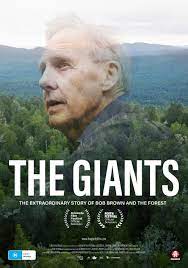
THE GIANTS
Australia, 2023, 113 minutes, Colour.
Directed by Rachel Antony, Laurence Billiet.
The giants of the title are trees. And, initially and right throughout the film, the camera focuses on extraordinary trees, extraordinary tall trees, Huon Pines, Eucalypts, Tasmanian Myrtles, lichen, algae, especially in the Tasmanian forests and, most especially, in the Tarkine forest. And, throughout the film, there is a range of scientists who open up to us the anatomy of trees, the life and vitality within the trees and on their surfaces, a world which most of us do not take into consideration. And we are invited to look at these trees with wonder.
And, to add to our awareness and knowledge, cinematic technology comes to our aid, three-dimensional photography of trees, computerised, animation PowerPoint material with technology charts, charts of growth and development, all instructive and fascinating.
Poet Joyce Kilmer once wrote: I think that I shall never see a poem lovely as a tree. So, here are trees in all their vitality, majesty, loveliness, ancient, taller than the dinosaurs, monuments to creative evolution. But – and this is the dynamic and thrust of the film – they are continually under threat from damming, loggers, woodchip industries, development decisions, with Australia under criticism.
But, the main giant focus of this documentary is Dr Bob Brown, longtime environmentalist, campaigner, politician, senator. In many ways, this is a feature-length portrait of him, a version of “Where Do You Think You Come from?”.
In fact, this is a very interesting cinema portrait of Bob Brown himself, on-screen frequently in family movie clips from the past, television interviews, television episodes of his campaigns, Parliamentary speeches, building up a portrait of him in the past. And, in his late 70s, he is also centre screen during the documentary, revisiting his past, literally going back to important locations from the past, especially the Franklin River.
Audiences with long memories will go back to the 1970s, the Tasmanian governments damming of the pristine Lake Pedder, the 1980s campaign against the damming of the Franklin River, Peter Dombrovskis’ classic photo of the River in the campaign, Bob Hawke stepping in, the decision of the High Court against the damming. Along with the many scenes of Bob Brown himself, there is also Karen Alexander of the Tasmanian Wilderness Society, highly praised by Brown for her commitment and activity.
But all this is set within quite a detailed look into Bob Brown’s personal life, a lot of commentary from his twin sister, Jan. There is a tribute to his policeman father, to his mother, quite a lot of detail about his growing up, interest in nature, his high schooling (and an episode of being sexually molested by a teacher), his University studies, medicine, surgery and Launceston.
And, many will realise that there is the extra dimension in this portrait of Bob Brown, his sexual orientation, his coming out in the late 1970s, courageous at the time, abuse from many combined with their abuse at his being a greenie. There are scenes of campaigner, Rodney Croom, and the change of legislation in Tasmania. The film shows how Bob Brown came to terms with this reality of his life, coming to an acceptance and peace, some scenes with his partner, Paul Thomas.
Which means that there is a great deal going on in this documentary. The Who Do You Think You Come From? aspect could have been a film in itself. The appeal to care for the environment, the campaigning, the episodes, the formation of the Australian Greens, the environmental career of Bob Brown could also be a film in itself.
And, all the way through, we return to the forests, to the trees, to growth, to heritage protection, to vistas of logging and devastation, continually relevant and challenging as we watch this film in the 2020s.
Mascarade/ Masquerade
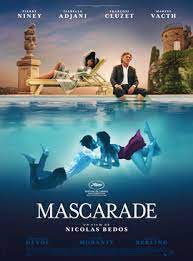
MASCARADE/ MASQUERADE
France, 2022, 135 minutes, Colour.
Pierre Niney, Isabelle Adjani, François Cluzet, Marine Vacth, Emmanuelle Devos, Laura Morante, Charles Berling, James Wilby.
Directed by Nicholas Bedos.
No honour among thieves – a possible subtitle indicating the consequences of this masquerade.
This is quite a lavish production, set on the French Riviera, a lot of attractive visuals with the tourist touch, and an entry into the world of Riviera society. The film opens with a caption from British author, W. Somerset Maugham: The Riviera isn’t only a sunny place for shady people. However, as this complex drama continues, all we see, really, are shady people and some sinister interactions.
This film is very French, French sensibility. Had the same plot been made on the Italian Riviera or on the Spanish coast, there would have been all kinds of melodramatic verve. However, the French sensibility is far more controlled, making unlikeable characters continue to be unlikable.
But, for aficionados of French cinema, the film has a strong cast, veterans from the past, Isabelle Adjani, François Cluzet, Emmanuelle Devos, Charles Berling, Laura Morante. And, at the centre, two of France’s rising stars, Pierre Niney and a particularly striking Marine Vacth.
The audience has to keep paying attention to weave its way through the intricacies of the plot. There is the introduction to Adrien (Pierre Niney), dancer, injured in an accident, taking up the position of gigolo to seemingly faded star of stage and screen, played by Isabelle Adjani. Then, there is an episode at the star’s party, the seductive Margot (Marine Vacth) recklessly seducing Adrien. We also see them at an apartment, a knock at the door, a man with a gun, Margot being shot.
The film uses the device of a court case which continues throughout the whole film, all of the key characters giving testimony, interrogated, with a range of flashbacks giving their version of events, the rehabilitation of the star with a successful theatre performance, her tangled relationship with Adrien and her dependence on him, a real estate agent, François Cluzet, and his long relationship with his wife, Emmanuelle Devos, and, more scheming and seduction by Adrien and Margot. Margot is coached in her deceptive behaviour by hotel honour, Giulia, Laura Morante, and an expose of real estate and financial corruption along the Riviera.
Most of the characters behave badly. Very difficult to warm to them in any kind of sympathy. So, we observe the contradictions in their characters, their continued bad behaviour, some seemingly good behaviour, more and more steps towards destruction.
As a court case draws to a close, there are some unexpected twists as well as a great deal of hurt to most of the characters.
An eminent reviewer finished his review by saying that all this is fun to watch. Not necessarily.
Guardians of the Galaxy Vol. 3
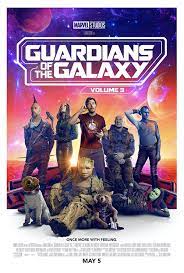
GUARDIANS OF THE GALAXY VOL. 3
US, 2023, 150 minutes, Colour.
Chris Pratt, Zoe Saldana, Bradley Cooper, Pom Klementieff, Dave Bautista, Karen Gillan, Vin Diesel, Chukwudi Iwuji, Will Poulter, Elizabeth Debicki, Maria Bakalova, Sean Gunn, Miriam Shor, Lynda Cardellini, Judy Greer, Sylvester Stallone.
Directed by James Gunn.
Some movies are review-proof. They have their audience, no matter what the reviewers say. And the audiences can have their blogs and tweets and… To affirm their faith. So with Guardians of the Galaxy, Involved. 3.
This reviewer has watched the three Guardians films and did not become a fan. The third volume (emphasis on volume!) Is long (2 ½ hours) and loud and very frequently, explosive. A distraction from the mayhem was the comment (perhaps cynical but not necessarily untrue) that Hollywood cinema is aimed at an audience of 14-year-old boys. This seems definitely the case here (and acknowledging that there among our moments for adults to enjoy and indulge their 14-year-old in a selves).
So, what to say? It has a spectacular look and final credits indicating a long list of special effects production. It also has quite a range on its music and songs Playlist, from classic to popular to metallic.
But, a big question about the plot and characters. The Marvel Universe invites us to suspend disbelief. All things are possible in the Marvel Universe of superheroes. And, looking at the members, the semi-humans, the strange origins, and, Groot always repeating, I am Groot, they are definitely an odd squad. But this group, posed together as a heroic band frequently during the film, as Guardians – and of the Galaxy?
This time the most sympathetic character is the cheerful raccoon, Rocket (voiced by Bradley Cooper). He collapses. He needs physical and technological help. The guardians go on a quest against a megalomaniac High Evolutionary ruler who wants Rocket’s power. And that, along with some detours, to a Counter-Earth (and a parody of some human behaviour) is what happens. And the rescue of Rocket.
Perhaps it sounds a little condescending, but how to put it rightly – the IQ in total of the Guardians is not exactly high. Chris Pratt’s Peter Quill might bluff his way as leader, but more brawn than brain. And his associates are a strange and unusual bunch, Dave Bautista as Drax being the most sympathetic, but always being told that he is stupid. Will Poulter turns up as a kind of Superman on the wrong side, disappearing and reappearing, and participating in the final heroics.
There are children victims of the High Evolutionary, wanting to create a new world after destroying Counter-Earth. And it all builds up to the final confrontation, rescue, battles, explosions.
This review is happy that the Guardians hand over authority to Rocket – and, during the final credits, we see what he can do in action. Volume 4?
Blue Caftan, The
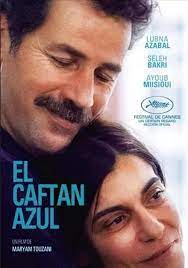
THE BLUE CAFTAN
Morocco, 2022, 124 minutes, Colour.
Lubna Azabel, Saleh Bakri, Ayoub Missioui.
Directed by Maryam Touzani.
A fine film.
It is from Morocco, filmed in the small area of a Moroccan town, streets and stores, especially a stall for fine needle craft for beautiful clothes, especially the blue caftan of the title. It has a female writer-director, Maryam Touzani, award-winning for her previous film, Adam, exploring the difficulties of an unmarried mother with her child in Moroccan society.
This is a quietly-paced story, gently told, drawing its audience in to identify with the three central characters, mainly in the store, their home, and a surprising outing to a bar, which is where men are meant to be, not women. We get to know the characters well, a great deal of close-up photography, and, as they work, as they experience illness, and their relationships, the use of extreme close-ups.
A tender film.
Halim is an expert craftsman in shaping fabrics, beautiful material, into garments, especially caftans, using skills that are gradually disappearing, and sewing giving way to sewing machines and speedy delivery of garments. Halim is middle-aged, quiet, laconic, but a gentle man, and gentlemen. His wife, Mina, is much more upfront, behind the counter, dealing with the customers, impatient with their quibbles and taste, delays in payment, the reliance on social status to get their own way. But, it emerges that she is not well, a later very moving sequence where a husband has to touch her, where her breast has been removed. Halim wants to do further tests but Mina realises that she is so ill it will lead to death.
There is an apprentice at the store, Youssef, eager to learn the craft, with a skill in needlework. Mina does not approve, having seen many apprentices come and go. However, Halim has a quiet regard for him. And, so, very quietly, the theme of sexual orientation, repression, especially in the context of Moroccan society and legislation against homosexuality, becomes part of audience consciousness. It does have its moments of more explicit reference, Halim going to visit to the local baths, suggestions rather than the more open revelations of Western culture films. The film, with the touch of its writer-director, shows a delicacy of intimacy.
Halim has great affection for his wife. He confides to Youssef that he had an unhappy childhood, a harsh father who established the store, but that Mina had erased all that bitterness and harshness of his early life. Halim is devoted to her, always quiet, attentive, staying at home to cook for his wife, caring for her as her illness grows. Mina is aware of what is happening to her, does break out when she persuades Halim to take her to the bar, the men all cheering a football match and she leaping to her feet yelling “goal”, to the puzzlement of the men and to Halim’s laughter. (On the way home they are accosted by the local police, wanting ID, wanting their marriage certificate.)
Mina is aware of Halim’s orientation, is patient with him, and bequeathing her love and encouragement as she dies. She has been harsh towards Youssef, a telling episode in the film about her accusing him of stealing some satin, her making a mistake about its whereabouts, discovering the truth but unable to tell Youssef, but finally a profound apology towards him.
At the end, Halim and Youssef carry Mina’s body through the town, a solemn procession, the final destination of the blue caftan – tribute paid to his wife and then a momentary glimpse of Halim and Youssef sitting quietly together in that bar.
A film of love and affection, of profound care, of desire, of restrain. A film for audiences to contemplate.
- The title, the opening credits and the close-ups of the blue fabric, the making of the caftan, the craftsmanship, the needlework, the customers and their response to the caftan? How lead and his final gift of the caftan to his wife, for her burial, and the procession through the streets?
- A Moroccan film, Moroccan culture, sensibilities? The locations in the town, the store, the home, the balcony and neighbours, the bar in the crowd? The final procession through the streets? The musical score?
- The director, her female sensitivity and sensibilities, quiet, delicate, social concerns, marriage, care, sexual orientation, in the context of Moroccan society and legislation?
- The portrait of Halim, his age, the quiet man, seen so often with his craft, his needlework, the close-ups of his precision? The store, inherited from his father? The craft, garments from 50 years earlier, the craftsmanship, no longer available, unknown, the age of the machine and rapid delivery? His work behind the scenes? His relationship with Youssef, the apprentice, the number of apprentices leaving, his encouraging yourself, the suggestions of affection? His response to Youssef’s declaration of love? His relationship with Mina, the many years of marriage, affection, at the store, at home, her illness, the tests and prognoses, the later revelation of the removal of her breast and her urging him to touch? The routines at home, the sexual sequences and Mina’s advance, his response? A lifelong fidelity to her?
- Mina, upfront, at the store, dealing with the customers, arguing with them, despising some of them and their rank, impatient with their choices, young girl, the older women, the elderly woman with her garment from the past? Expectations of Halim? His working, getting behind, financial needs? At home, the meals, care for Halim? The bedroom sequence and her advance, her needs? Her illness, her knowing that she was to die? Urging Halim to work? His staying, taking over the cooking, caring for her at home? Her suspicions of Youssef, apprentices coming and going, the issue of the pink satin, accusation, his denial, the merchant bringing back the satin, her hiding it, not telling Youssef, his visiting the house, her changing, the importance of the apology and her tears? His tears?
- The sequences of her illness, pain? Yet a devout Muslim, her clothes, rituals of prayer? In God’s hands?
- Her decline in health, her death? Lying in state, the ritual of not touching her or her clothes, Halim touching, changing her into the blue caftan, the procession?
- Halim, his orientation, repressed, his marriage, his statement that Mina erased all the hurt of his growing up in the treatment by his father? His continued affection for her, his love for her? His going to the bars, the men in the cubicles? Declaration by Youssef, his response, the distance, yet the closeness, the touch? Youssef coming to the house, the bond between them, Mina observing this, her bequest to them?
- Youssef, wanting to be an apprentice, to learn the craft, his skills, the detailed instructions from Halim? His declaration of love? The accusation by Mina? His returning, concern about the store, working on the garments, Mina and her apology, his tears?
- Mina lying in state, Youssef coming in, the change to the blue caftan, and his carrying the body with Halim through the streets?
- The final moment, the sitting together at the bar, the future?
